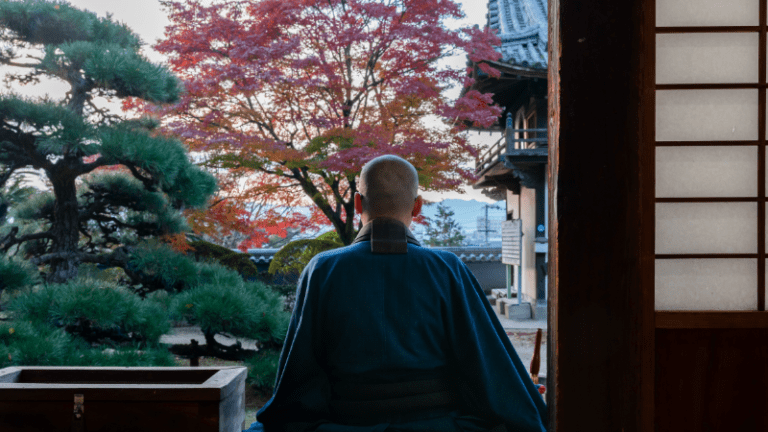5 Ways to Apply Buddhist Philosophy in Everyday Life
Want to learn how to live a good life full of happiness? Buddhist philosophy can help you do just that. In this blog post, we'll discuss the 3 Noble Truths of Buddhism and how you can apply them to your own life. We'll also talk about the 8-fold path to enlightenment and how you can walk it. And finally, we'll show you 5 ways you can apply Buddhist philosophy to your everyday life. Whether you're new to Buddhism or have been practicing for years, this post has something for everyone!
What is Buddhist philosophy and how can it help you live a good life
Buddhist philosophy is based on the teachings of Siddhartha Gautama, also known as Buddha. The Buddha was born in India in the sixth century BC and is considered the founder of Buddhism. His teachings have helped millions of people live better lives, and they can help you too!
How exactly did he find Buddhism?
The Buddha was not the first person to teach Buddhist philosophy, but he was the first to transform it into a system that we can follow today. Before the Buddha, there were many different schools of thought in India, all vying for attention. The Buddha's approach was unique in that he tried to find a middle way between these competing philosophies (you can read about the concept of the Middle Way in this article is for you experienced).
His personal journey may sound like he lost everything to find himself, and the Buddha has indeed been through a lot in his life.
He was born into an extremely wealthy family, but later renounced all his material possessions, became a monk, and searched for a way to end suffering. He spent years meditating and studying various philosophies, and finally came to the conclusion that the only way to end suffering is to let go of our attachments.
Gautama Buddha: Who and How Was He Really?
This may sound difficult, but the Buddha believed that it is possible for everyone to achieve our true nature and thus happiness and peace. And he was right! Buddhist philosophy can help us live a better life, even if we don't have everything we want.
But in order to achieve this, we must realize what is preventing us from doing so. According to Buddha, the answer is the idea that suffering prevents us from doing this. But he also told people about another idea (or rather concept): that life is suffering.
Did that mean we were at an impasse? No, fortunately it does not mean that. But we need more knowledge about suffering, and that knowledge comes in the form of the Four Noble Truths of Buddhism.

The 4 Noble Truths of Buddhism - what they are and how you can apply them in your life
The first step to living a good Buddhist life according to Buddhist philosophy is to understand the Four Noble Truths. The Four Noble Truths are:
- The Truth About Suffering (Dukkha)
- The Truth about the Origin of Suffering (Samudāya)
- The Truth about the Cessation of Suffering (Nirodha)
- The Truth about the Way to End Suffering (Magga)
These truths may seem bleak at first glance, but understanding them is important to living a good life. Let's take a closer look at them:
All life is suffering. This may sound negative at first, but it is important to understand that suffering is a part of life and we must accept it. It simply cannot be avoided. However, we can learn to deal with our suffering in a healthy way.
Suffering is caused by desire and thus by our own mind. This is because we often want things that we cannot have, or we want things to be different from what they are. When we suffer, it is usually because our desires are not being fulfilled.
Suffering can be ended by eliminating desire. This does not mean that we should never desire anything. It does mean that we should reflect on our desires and learn to let go of those that are not helpful.
There is a path that leads to the end of suffering. This path is known as the Eightfold Path. The Eightfold Path is a set of guidelines that followers of Buddhism put into practice to live their lives as best they can.
The 8-fold path to enlightenment - what it is and how to walk it
The second step to a good life according to Buddhist teachings is the Eightfold Path. The Eightfold Path is a set of guidelines that help us live more ethically and spiritually. It includes the following eight components:
- Right understanding
- Right thinking
- Right speech
- Right action
- Right livelihood
- Right effort
- Proper mindfulness
- Proper concentration
Each of these components is important, but you don't have to achieve perfection in all areas to live a good life. Just use this knowledge and strive to do your best and pay attention to the impact your actions have on yourself and other people in everyday life.
Tips to integrate Buddhist philosophy into your daily life
The final step to living a good life according to Buddhist philosophy is to integrate it into your daily life. This can be done in many different ways, but here are a few suggestions:
1. practice meditation
Meditation can help you become more aware of your thoughts and feelings, and it can also help you let go of those that are not helpful.
Quick guide to meditation:
- Sit in a comfortable position with a straight spine.
- Close your eyes and take a few deep breaths.
- Focus your attention on your breath.
- If your mind wanders, gently bring it back to your breath.
- Do this for five to ten minutes.
A daily meditation practice can have great benefits, bring inner peace and also be a real highlight of your day.

The different types of meditation
There are many different types of meditation, but some of the most popular are:
- Mindfulness meditation: This type of meditation is about focusing your attention on the present moment.
- Kindness Meditation: In this type of meditation you send positive thoughts and feelings to yourself and others.
- Visualization meditationIn this type of meditation, you create a positive image in your mind and focus on it.
- Spiritual meditation: In this type of meditation, you connect with a higher power or your true self.
- Focused Meditation: In this type of meditation, you focus on a specific object, such as your breath.
- Movement meditation: In this type of meditation, you focus on your body and movement.
- Mantra meditation: In this type of meditation, you repeat a mantra, a sacred word or phrase.
- Transcendental Meditation: In this type of meditation, you sit comfortably with your eyes closed and repeat a mantra.
- Progressive relaxationIn this type of meditation, different muscle groups of your body are tensed and relaxed.
- Guided meditation: In this type of meditation, you follow a guided meditation recording and is therefore well suited for beginners.
You don't have to choose just one type of meditation. Depending on what you're looking for, you can experiment with different types and see which works best for you.
If you are new to meditation, you don't have to meditate for a long period of time right away. It's best to start with short sessions and gradually increase the duration of meditation.
Don't worry if you can't sit still or your mind is constantly racing. Meditation is a practice, and it takes time to learn how to use it effectively. Just keep at it and you'll see the benefits - inner peace, for example.
2. be mindful in your actions
The Buddha taught that our actions have an effect on ourselves and others. He said that if we want to live a happy life, we should act in such a way as to make ourselves and others happy.
Therefore, it is important to train our minds to be truly mindful of the things we do and say.
Examples of mindfulness practices:
- Pay attention to your thoughts and feelings throughout the day. Ask yourself if they are helpful or harmful. Are they harmful to you?
- Be aware of your surroundings and the people you interact with. Ask yourself what effect your actions have on them. Does it harm these people? Or even yourself?
- Notice the effects of your actions on yourself and others. Ask yourself if your actions are helpful or harmful. What have you caused?
You can be mindful about pretty much anything. Things you can think about are: the self, your body, a person, nature, the earth, reality itself, and so on.
This practice is so valuable, but modern society has reached a point where mindfulness is actually not practiced as often. Most people today seem to be too busy or in fear of feelings and emotions.
Thinking about yourself can give you good direction on how to spend your time in this world.
3. get rid of unnecessary things
Buddhist philosophy teaches that attachment to material possessions is one of the main causes of suffering.
This is because in Buddhism, attachment to things can cause suffering. According to Buddhist ideology, attachment leads to craving and desire that can never be fully satisfied. As a result, people are never truly satisfied and are always chasing after something they cannot have. This cycle of dissatisfaction can only be broken by completely letting go of attachment.
Therefore, you need to take action, get rid of things you don't need and focus on what is really important.
4. help others
You may not have expected this point, but Buddhist philosophy teaches that we are all connected. So help others when you can. Show them compassion and loving kindness and that common courtesy everyone talks about. Most of it consists of being kind and gracious and caring for others as you would want others to do for you. The old saying about treating others as you would want to be treated? That also comes from Buddhism.
Please note that this is not limited to other people, but to other beings in general.
And let me tell you: Helping others can make you find joy. Very much.
Relationships are an important part of our lives and something that can cause both joy and pain. If you want to learn how to have good relationships, this article is for you: Buddha on Relationships: Understanding Yourself and Others in Relationships
5. live in the present moment
One of the most important aspects of Buddhist philosophy is the importance of living in the now. This means being aware of one's thoughts and feelings and accepting them without judgment.
Buddhist philosophy revolves around the meaning of life. This philosophy teaches that life is a precious gift and should be treated as such. Buddhists believe that other beings also deserve to be respected and valued.
These things will help you live purposefully in this world and let you discover true meaning and happiness. You will see the benefits not when you are well trained, but quite early. Just stick to daily practice and you will see what we mean.
Other things you might want to do
As you can imagine, the above points are just a few of the many things you can do to apply Buddhist philosophy to your daily life. If you want to learn more, the following two points are for you:
Read Buddhist texts
Books are an important part of Buddhist practice, so there are many good Buddhist books available. Take some time to discover the books that appeal to you. You might start with the classic text, the Lotus Sutra. If you're looking for something more modern, you should read the Heart Sutra. There are so many wonderful options, so dive in and begin your journey!
Find a Buddhist community
If you are really interested in the subject of Buddhism and want to incorporate it more deeply into your spiritual life, consider getting in touch with Buddhists. There are probably Buddhist communities near you, so get involved and meet new people.
Resources to learn more about Buddhism and its teachings
If you want to learn more about Buddhist philosophy, there are many good resources. Here are a few that we recommend:
- The Buddha's Teachings by Siddhartha Gautama
- The Dhammapada of the Buddhist monk Buddharakkhita
- Buddhism for Beginners by Thubten Chodron
- Zen Mind, Beginner's Mind by Shunryu Suzuki
Zen Buddhism originated from Buddhism and is therefore quite similar, but certainly not the same. You want to know about the differences? This article discusses them all.
Learning Buddhist philosophy (and acting on it!) can be a great way to improve your life. You could even say it's a good way to self-care. Remember to take things one step at a time and be patient with yourself. Buddhist philosophy is not about achieving perfection, but rather about living a good life in this world.
Do you have tips on how to integrate Buddhist philosophy into your daily life? Share them below in the comments!
And if you found this article helpful, please share it with your friends! Buddhist philosophy has the potential to change lives for the better and we want as many people as possible to have access to these teachings. Thanks for reading!
If you want to learn more about Buddhist philosophies for achieving happiness:
Is There a Way to Happiness? (Buddha's Answer)







